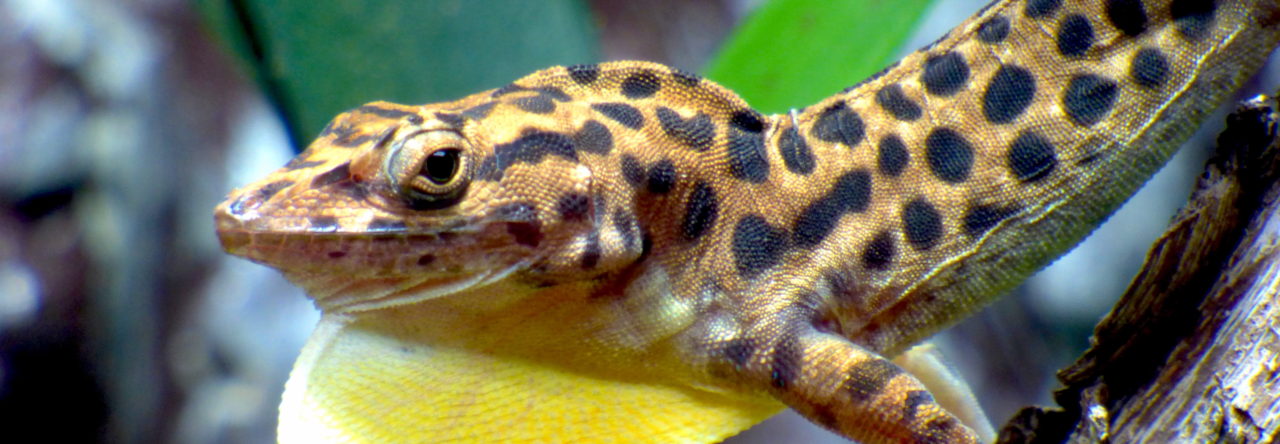Anole Annals more or less turned one-half-year-old this month, making this a good time to look back and reflect. Readership continues to increase—we’re now getting an average of 202 readers and 351 page views a day. AA has published 208 posts by 30 authors from four continents and the Caribbean. For those new to the fold, here’s an annotated list of the 12 most popular posts, as judged by number of page views*:
1. Society for the Study of Evolution Announces Changes to the Name of its Journal
Far and away the most viewed, thanks to some Facebook re-posting in highly visible sites, this post documented the repeated appearance of anoles on the cover of the journal Evolution. Combined with the fact that an anole was the frontispiece for the program for the society’s annual meeting and that four of the six young scientists honored for their contributions at the meeting work on anoles (here, here, and here, plus Rob Pringle), the
suggestion that the society should reconsider it’s name seems quite reasonable.
2. Anole Annals Trivia: Find the Anoles
Always a crowd pleaser. ‘bout time for another one. Suggestions welcome.
A post on the anole trade, and how some supposedly wildcaught animals couldn’t possibly have been collected legally. I’m betting the popularity of this post is due to people looking for something other than the discussion they got.
4. Why Larger Islands Have More Anole Species
A discussion of recent analytical developments by Rabosky and Glor explaining patterns of anole species richness in the Greater Antilles. Check this out if only to see the lovely PNAS cover.
5. Darwin’s Finches vs. Anoles
Summary of a book chapter comparing the adaptive radiations of Darwin’s finches and Greater Antillean anoles
6. Forum: What Makes the Best Noose?
Everyone has his or her own opinion, but dental floss is the correct answer. This is the most commented upon AA post (we’ve had 400 comments so far, so no need to be shy)
7. Anolis carolinensis Genome Paper Submitted
A surprisingly popular three-sentence post. Clearly, the field is impatient for this to be published. More news on this front soon.
8. Field Assistants Sought for Summer Anole Fieldwork in the Bahamas
Not hard to figure this one out. Read about the exploits of the three lucky winners here.
9. Interview With the Lizard Whisperer
Lily Capehart is, as far as we’re aware, the only person to discuss anoles with David Letterman and Ellen DeGeneres. We caught up with her to see what’s happened since her meteoric rise to anole fame five years ago.
10. Galapagos Finches and Antillean Anoles Compared, Plus Some Miscellany from Joan Roughgarden
Joan Roughgarden provided a Lesser Antillean perspective to contrast with that in #4 above, and also discussed other research ideas and directions past and present
A relatively recent post reminiscing on field work gone by and new directions
12. Yuck! Maggots in the Mouth
Every day, WordPress lists the search terms that have led readers to Anole Annals. Not infrequently, “maggot mouth” or “maggot in mouth” are amongst them. What the heck? One wise anolologist suggested that there might be a rock band by that name and, sure enough, there is. This post, however, is actually about maggots in the mouth of
a Hispaniolan crown-giant anole, and has some cool photos.
As this list indicates, Anole Annals publishes all kinds of posts from all kinds of people. Anything from a photograph of an interesting lizard to a detailed story, lengthy commentary, or review of recent or classic literature. Now that we’re in mid-summer and many readers are out and about, seeing, thinking, and dreaming about anoles, what better
time for you to dash off a post?
For what it’s worth, this correspondent’s favorite post is also one of the most recent, describing the exploits of Gordon, the green anole who was swallowed by a treefrog and lived to dewlap about it.
_________
* Of course, there are a number of biases in using this metric. Most obviously, it favors older posts that have been around longer. In addition, it does not include readers who view a post from the homepage, but only those requiring a click to that specific post. This also means that posts “continued” onto another page from the home page will have more views.


Leave a Reply